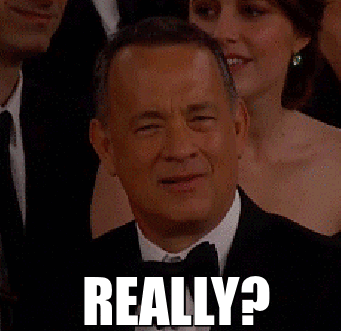Really Her Shirt - The Power Of A Simple Word
Sometimes, a single word can shift the whole feeling of a sentence, giving it a new kind of impact. It’s like adding a quiet emphasis, or maybe a sense of true discovery, to something you are saying. This little word, often overlooked, actually carries a lot of weight in how we share our thoughts and feelings. It can make a plain statement feel more sincere, or perhaps even question what was just said. The way we use it shapes how others take in our message, making it a very useful tool in everyday talks and more formal writings alike.
You see, this particular word has a knack for getting at the very heart of things, pointing to what is genuine or what is truly happening. It lets us express a strong belief, or it might just show that we are surprised by something. We often toss it into our speech without much thought, yet it helps us get across a deeper level of meaning, or just how much we mean what we are saying. It helps people grasp the full weight of a statement, or maybe the feeling behind it, which is rather important for clear communication.
When you hear someone use this word, it can change how you feel about what they are sharing. It adds a certain flavor, making a simple description feel more authentic or perhaps more pressing. This tiny piece of language helps us put more of ourselves into our words, showing our real thoughts or how strongly we feel about something. It’s a subtle way to connect, to make sure the listener or reader gets the true sense of what is being put forth.
- Alicia Smith Wxyz Age
- American Meadows Nursery
- Spinners Florence Ms
- Apnetvto
- Carolyn Bessette Kennedy Wedding Pictures
Table of Contents
- What Does "Really" Mean, Anyway?
- Understanding the Core of "Really Her Shirt"
- How Does "Really" Show Up in Our Language?
- The Many Faces of "Really Her Shirt"
- Why Does "Really" Make Such a Big Difference?
- Making a Point with "Really Her Shirt"
- Are There Other Ways to Say "Really"?
- Getting to the Heart of "Really Her Shirt"
What Does "Really" Mean, Anyway?
The word "really" has a meaning that points to what is true or what exists in the actual world. It is a way of saying that something is not just a thought or an idea, but something that is happening or is a fact. For example, when someone says a thing is "really" good, they are saying it is good in a way that is true and not just pretend. This word helps us talk about things that are genuine, or what is actually taking place. It gives a sense of certainty to a statement, making it feel more solid. You see, it helps us confirm that what we are talking about has a basis in truth, or that it is not just a guess. It is a way to make sure that the listener or reader understands that the speaker believes what they are saying to be correct. This little word, then, gives statements a feeling of being very certain, which is quite useful when we want to be clear about things.
When we look at how people use this word, it often comes up when they want to make a point that something is for sure. It helps to show that there is no doubt about what is being said. It is like putting a firm stamp on a statement, letting everyone know that this is how things are, without question. This can be important when you are trying to convince someone, or just when you want to share a piece of information that you know to be true. So, it is a word that helps us share what we believe to be true with a good deal of conviction. It is used to express that something is certain, which is a big part of how we communicate what we know.
Understanding the Core of "Really Her Shirt"
When we think about the phrase "really her shirt," the word "really" changes the whole sense of it. Without "really," it is just "her shirt," a simple statement of ownership. But when "really" is added, it brings in a question of truth, or perhaps a strong confirmation. It could mean, for instance, that there was some doubt about whether the shirt belonged to her, and now that doubt is gone. Or, it might mean that the shirt is not just hers, but truly, deeply hers, perhaps in a way that makes it stand out. This small word makes us pause and think about the shirt's connection to her in a deeper way. It makes us consider the actual ownership, or maybe the true nature of the shirt's belonging. It could also suggest a feeling of surprise, as if someone did not expect it to be "really her shirt."
So, too, it's almost like "really" acts as a little spotlight, shining on the connection between "her" and "shirt." It can clear up any confusion or just add a layer of emphasis. It helps to make sure that the listener gets the full weight of the statement, whether that is about ownership, surprise, or just a clear confirmation. It turns a plain description into something that carries more meaning, or perhaps a bit of wonder. This is how a small word can make a big difference in how we talk about everyday things, like "really her shirt." It makes us consider the true state of affairs, or the actual belonging of an item.
How Does "Really" Show Up in Our Language?
The word "really" appears in our language in many ways, often to add a bit of extra oomph to what we are saying. It can be found with words that describe things, or with words that show actions. For example, you might say someone "really" runs fast, or that a cake is "really" tasty. In these cases, it makes the description stronger, showing a higher level of speed or flavor. It is a word that helps us express how much something is true, or how much a quality is present. It acts as a way to turn up the volume on a statement, making it more impactful. This is one of its main jobs in our daily conversations, helping us share stronger feelings or more certain facts. It helps people get a better sense of the intensity of a quality or an action.
This word is also used to refer to things that are actual or genuine. If you are talking about something that is truly what it seems, "really" helps to make that clear. It can help to confirm that something is not fake or imagined, but something that exists in the real world. For instance, if you find a very old coin, you might say it is "really" old, meaning it is genuinely from a long time ago. This use helps to point out the true nature of something, making sure there is no mistake about its authenticity. It helps us speak about things as they are, without any doubt about their true form or state. It is a word that helps us confirm the genuine nature of something we are discussing.
The Many Faces of "Really Her Shirt"
The phrase "really her shirt" can take on different meanings depending on how you say it, or what you are thinking when you say it. For instance, if you say it with a rising tone at the end, it becomes a question: "Really her shirt?" This asks if it is true that the shirt belongs to her, perhaps because it looks different, or you thought it belonged to someone else. This is a very common way to use "really," turning a statement into an inquiry, or expressing surprise. It shows that you are seeking confirmation, or that you are a bit taken aback by what you are seeing. It is a simple way to ask for more information, or to show that something is unexpected. It helps to express a sense of wonder or a need for clarity about "really her shirt."
On the other hand, if you say "really her shirt" with a firm, falling tone, it acts as a strong statement of fact. It means, yes, without a doubt, it is hers. This use of "really" serves to emphasize certainty, removing any possible question. It makes the statement stronger, letting everyone know that this is the truth of the matter. This shows the word's power to confirm, to make something undeniable. It helps to put a firm stamp on a piece of information, making sure there is no room for doubt. So, it is a word that can either ask a question or give a very clear answer about "really her shirt," all depending on how it is spoken.
Why Does "Really" Make Such a Big Difference?
The word "really" makes a big difference because it adds a layer of depth to our communication. It is not just about stating facts; it is about conveying how true those facts feel, or how certain we are about them. When you say something is "really" true, you are adding your personal conviction to the statement. This helps the listener to feel the weight of your words, or to understand the strength of your belief. It is a way to connect with others on a more personal level, showing them that you are sincere. This little word helps to build trust, because it signals that you are speaking from a place of genuine belief. It helps to make your words more impactful, or more believable, which is quite important in daily talks. It helps to share a sense of genuine belief, or a deep level of certainty.
Moreover, it can help to clear up misunderstandings. If there is any doubt about something, using "really" can help to set the record straight. It acts as a way to confirm something that might have been unclear, or to emphasize a point that needs to be understood. For example, if someone thinks you are joking, saying "I really mean it" can show them that you are serious. This helps to ensure that your message is received as you intend it, without any confusion. It is a simple way to add clarity, or to make sure that your true intentions are known. So, it is a word that helps to remove doubt, or to make your meaning very clear.
Making a Point with "Really Her Shirt"
When you use "really" with "her shirt," you are making a point, or perhaps expressing a strong feeling about it. If you say, "That is really her shirt," you might be pointing out that it fits her perfectly, or that it suits her style very well. It is a way of giving a compliment, or just showing that you notice something special about the shirt on her. This shows how "really" can add a layer of personal observation or appreciation to a simple description. It is not just a shirt; it is a shirt that has a strong connection to her, in a way that is worth noting. It helps to share a feeling of recognition, or a sense of how well something fits. It is a way to make a comment about the actual appearance or suitability of "really her shirt."
Alternatively, if there was a mix-up, and someone thought the shirt belonged to someone else, saying "That is really her shirt" serves to correct the mistake. It makes a clear statement about the true owner, leaving no room for further error. This shows "really" acting as a tool for factual correction, or for setting things straight. It helps to ensure that everyone has the correct information, or that any confusion is cleared up. So, it is a word that helps to confirm facts, or to express a strong observation about "really her shirt," making sure the message is clear and understood.
Are There Other Ways to Say "Really"?
There are indeed other ways to express the ideas that "really" brings to a sentence, though each has its own slight flavor. You might use words like "actually," "truly," or "genuinely" to get across a similar sense of truth or certainty. For example, instead of "It's really cold," you could say "It's actually cold," or "It's truly cold." Each of these gives a feeling of something being factual, or something that exists in the real world. They help to confirm that what is being said is not just an idea, but something that is happening. These words are used to show that something is authentic, or that it is not fake. They help to make a statement feel more solid, or more believable, which is quite helpful when you want to be clear. So, there are words that can stand in for "really," though they might feel a little different in their impact.
Some words, like "very" or "extremely," can also take the place of "really" when you want to show a high degree of something. For instance, "It's very good" or "It's extremely good" can express a similar level of quality as "It's really good." These words help to turn up the intensity of a description, showing that something is present in a high amount. They are often used to emphasize a quality, or to show how much something is true. While they do not always carry the same sense of "in reality" as "really" does, they can still make a statement feel stronger. They help to add a bit of extra punch to a description, or to show a greater level of something. So, there are options for expressing emphasis, or a high degree of something, though "really" has its own unique way of doing it.
Getting to the Heart of "Really Her Shirt"
When we get to the core of "really her shirt," it is about more than just the words themselves; it is about the feeling and the exact meaning they create together. This phrase, with "really" in it, asks us to think about the true state of affairs. It pushes us to consider if the shirt is indeed hers, or if there is something special about it being hers. It is a way of making a simple observation carry more weight, or perhaps more wonder. The word "really" makes us look closer, to see the deeper connection between the person and the item. It is a subtle invitation to explore the truth behind a simple statement, or to appreciate a certain quality. It helps to bring out the genuine nature of the connection, or the actual belonging of "really her shirt."
This phrase, in a way, shows how a small word can make us pause and think about what is real. It can be a simple confirmation, a question of doubt, or an expression of surprise. All of these meanings come from that one little word, "really," which acts as a guide to the true sense of the statement. It helps us to grasp the full meaning, or the actual situation, that is being described. So, the heart of "really her shirt" lies in the power of "really" to shape our perception and to make us consider the genuine nature of things. It helps to make a common phrase carry a deeper level of meaning, or a stronger sense of truth.
This article has looked at the word "really," exploring how it means "in reality" and how it helps us show certainty in our sentences. We talked about how it is used to describe things that are actual or genuine, and how it can emphasize actions or qualities. We also considered how this word, when paired with "her shirt," can change a simple statement into a question, a strong confirmation, or an observation about a true connection. The discussion covered how "really" adds depth and clarity to our language, making our communication more impactful. We also touched upon other words that can express similar ideas, but noted that "really" has its own special way of conveying truth and emphasis.

Justin Timberlake Really GIF - JustinTimberlake Really Stare - Discover

GIF: Tom Hanks Saying “Really?” | Gifrific

Really? - Reaction GIFs